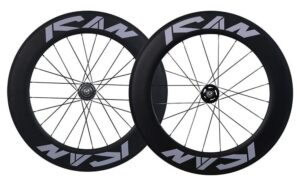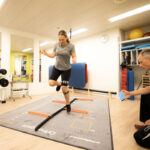With the triathlon off-season upon us, it’s time to focus on what we need to do to achieve our 2022 race goals. To that end, most of your time and energy during this “down time” (in quotes because there is very little down in your time!) will be devoted to building your fitness in the swim, bike, and run. But, in addition to focusing on ways to propel you forward next season, it may also be helpful to explore what might be holding you back, so you can release those “anchors” and go full speed ahead untethered when the 2022 race season begins.
 Do you ever feel as if something is holding you back from making progress toward your athletic goals? Though a big part of you wants to get where you want to go, there seems to be another part of you that doesn’t want to get there? Do you sometimes feel like there is an internal battle between those two sides of you and the “dark side” is winning? Do you feel confused and frustrated when you do things that are clearly not in your best interests, but you can’t seem to stop yourself from going down the bad road. If so, you’re not alone. Athletes often come to me because they aren’t performing well and don’t know why. After we explore what is going on with them, the vast majority learn that there is something holding them back. They just don’t know that something is.
Do you ever feel as if something is holding you back from making progress toward your athletic goals? Though a big part of you wants to get where you want to go, there seems to be another part of you that doesn’t want to get there? Do you sometimes feel like there is an internal battle between those two sides of you and the “dark side” is winning? Do you feel confused and frustrated when you do things that are clearly not in your best interests, but you can’t seem to stop yourself from going down the bad road. If so, you’re not alone. Athletes often come to me because they aren’t performing well and don’t know why. After we explore what is going on with them, the vast majority learn that there is something holding them back. They just don’t know that something is.
This article is the first in a nine-part series in which I will take a “deep dive” into the most common obstacles that hold triathletes back from giving their best efforts and achieving their race goals. My objective is to make you aware of any obstacles that you might find within yourself and also provide you with some insights and tools to help you remove it from your path toward your most dearly held triathlon (and life) goals.
The Power of the Unconscious
The reason why many athletes who feel as if something is holding them back can’t figure out what is because of what I call the “power of the unconscious.” So much of what drives us is outside of our awareness. This experience is frustrating because we, as humans, like to know why we do what we do. Yet, there are forces in our unconscious that impact what we think, how we feel, and how we act on and react to the world around us: primitive instincts, emotions, and reactions; emotional baggage from our upbringing, and bad mental habits. And these same forces have an immense influence on your triathlon performances. Unfortunately, many of these unconscious forces have an unpleasant, unproductive, or unhealthy impact on your efforts. You may experience the dark side as doubt, worry, stress, fear, frustration, and many other thoughts and emotions that hurt your efforts, performances, and enjoyment in our sport. In all likelihood, your dark side is driven by one, some, or all of the five obstacles that I will describe in this series.
upbringing, and bad mental habits. And these same forces have an immense influence on your triathlon performances. Unfortunately, many of these unconscious forces have an unpleasant, unproductive, or unhealthy impact on your efforts. You may experience the dark side as doubt, worry, stress, fear, frustration, and many other thoughts and emotions that hurt your efforts, performances, and enjoyment in our sport. In all likelihood, your dark side is driven by one, some, or all of the five obstacles that I will describe in this series.
What was Once Functional is Now Dysfunctional
To help you better understand the impact of these obstacles on your triathlon performance, I want to explain where they come from and how they arise. Most basically, the obstacles develop from the experiences you have in your social world, primarily from your parents and significant others in your life such as coaches, teachers, siblings, extended family, and, more recently, our culture as communicated through technology and social media. The purpose of these obstacles when you were young was to protect you from people and situations in which you felt uncomfortable. If you grew up in an environment that you perceived as threatening, you developed strategies to help you cope with the difficult situations. The obstacles caused ways of thinking, feeling, and behaving that helped you function and feel safe in your childhood.
 For example, imagine you grew up with a perfectionistic and controlling father who not only role modeled these qualities in his own behavior, but also sent you messages of conditional love (if you get straight As and win in your sport, he lavishes you with love and praise; if you get a B+ or have a poor sports performance, he expresses anger toward you). To deal with this very uncomfortable situation, you adopt the same qualities, driving yourself unmercifully to succeed and needing to feel in control. At the time, these qualities were highly functional because they enable you to avoid your father’s wrath. Moreover, because these ways of thinking, feeling, and behaving were functional, you continued to use them, and they become ingrained habits and you become a perfectionistic and controlling person in adulthood.
For example, imagine you grew up with a perfectionistic and controlling father who not only role modeled these qualities in his own behavior, but also sent you messages of conditional love (if you get straight As and win in your sport, he lavishes you with love and praise; if you get a B+ or have a poor sports performance, he expresses anger toward you). To deal with this very uncomfortable situation, you adopt the same qualities, driving yourself unmercifully to succeed and needing to feel in control. At the time, these qualities were highly functional because they enable you to avoid your father’s wrath. Moreover, because these ways of thinking, feeling, and behaving were functional, you continued to use them, and they become ingrained habits and you become a perfectionistic and controlling person in adulthood.
As you transitioned from childhood to adolescence to adulthood, you continued to these ways out of habit even though, with the natural maturation process, you gain experience, improved coping skills, and have more resources that could provide other, healthier ways of dealing with your father. Your perfectionistic and controlling tendencies still cause you to be severely self-critical, fear failure, avoid reasonable risk taking, and make you feel miserable. As a consequence, these qualities shift from being functional in your childhood to dysfunctional in your adulthood, in other words, they go from helping you in your life by making you feel safe around your father in the past to interfering with you as you pursue your athletic and life goals in the present.
taking, and make you feel miserable. As a consequence, these qualities shift from being functional in your childhood to dysfunctional in your adulthood, in other words, they go from helping you in your life by making you feel safe around your father in the past to interfering with you as you pursue your athletic and life goals in the present.
As you explore my series and identify obstacles that are holding you back, you have two goals. First, more generally, to let go of those now-dysfunctional habits and think, feel, and act in ways that are based on who you are now (not who you once were) and that support, rather than interfere with, the pursuit of your goals. Second, at a more practical level, to bring the unconscious obstacles to your consciousness:
- Understand how the obstacles affect you,
- Become aware of them when they get in your way,

- Gain insight into where they came from, and, ultimately,
- Remove them so you have a clear path to your goals that you can pursue without doubt worry, or hesitation and with confidence, courage, and abandon.
Do you want to take the next step in training your mind to perform your best in training and on race day? Here are four options for you:
- Read my latest mental training book: Train Your Mind for Athletic Success: Mental Preparation to Achieve Your Sports Goals.
- Listen to my Train Your Mind for Athletic Success
- Take a look at myonline mental training courses.
- Schedule a 1:1 session with me.





